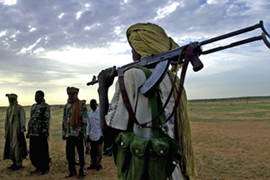Oil fuelling Sudan tensions
Oil rights and revenues are threatening to pull Sudan back into military conflict.

 |
| Fighting to control South Sudan’s territories rich in oil reserves has displaced hundreds of thousands of people [GALLO/GETTY] |
Oil has been a determining factor in all peace initiatives brokered to end the 22-year-old Sudanese civil war, the longest military conflict in Africa.
The appropriations of oil exploration rights and revenues have also proven to be stumbling blocks in the formation of a national unity government in Sudan in the wake of the 2005 Comprehensive Peace Agreement (CPA).
Keep reading
list of 4 items‘Why should we vote?’ India’s jute workers blame politicians for woes
California farmworkers cheer new housing in town scarred by mass shooting
Russia’s Putin eyes greater support from China for Ukraine war effort
With a large pool of oil reserves located mostly in the south, human rights organisations have alleged that foreign oil companies have been partially responsible for prolonging the conflict.
While foreign companies began exploration in 1959, in 1979 Chevron was the first to strike oil in the Muglad Basin, which stretches southeast through the middle of the country.
Oil consortium
In 1983, a consortium of oil companies, including Chevron and Royal Dutch Shell, formed the White Nile Petroleum Company hoping to build a pipeline from the basin to Port Sudan on the Red Sea.
 |
| Agro-pastoralists were forced off their land to make way for oil drilling[EPA] |
Hoping to gain control of the Basin, Khartoum in 1983 implemented a strategy of displacement, looking the other way as government-armed tribes grabbed land from agro-pastoralists such as the Nuer and Dinka who had lived there for centuries.
Looting, burning of villages and cattle, and the threat of death forced many to flee, leaving behind an area rich in oil and waiting to be drilled.
The Sudanese government also began implementing Sharia Law throughout Sudan in 1983, leading to protests and all-out hostilities between the mostly Muslim north and the south.
Local non-Arab tribes in the south began to arm themselves and eventually formed the Sudan People’s Liberation Army (SPLA).
As humanitarian and security conditions began to worsen in the south, Chevron was forced to abandon its plans and sell its stake to other Sudanese oil firms.
Hoping to rein in the fighting which led to Chevron’s departure, Khartoum intensified its support for marauding groups who intimidated southern tribes. The SPLA retaliated and the conflict intensified until its conclusion in 2005.
However, disputes over oil wealth appropriation continue.
In 2005, negotiations to form a national unity government stumbled as the SPLM and Khartoum refused to relinquish the crucial energy and mining portfolio to the other.
Oil deals
The Sudanese government has over the years entered into business partnerships with oil companies such as Canada’s Talisman Energy, Sweden’s Lundin Oil, Malaysia’s Petronas and China’s state-owned China National Petroleum Corporation.
Until the comprehensive peace agreement of 2005, all oil revenues were strictly divided between the foreign companies and the Sudanese national oil company Sudapet.
South Sudanese instititions received nothing.
A report issued by Christian Aid, an international development agency, said: “Military protection is also part of the partnership. As in many conflict-ridden countries, the oil companies are themselves targets. The SPLA has declared oilfields and oil companies to be legitimate military targets; one of its local commanders has attacked oil installations …”
The recent fighting between the SPLA and the Misairiya tribes around the southern Abeyei district remains a stark manifestation of the potential danger of sparking a wider conflict in this oil-rich region.
If such a scenario materialised, it could drag Sudan’s neighbours into a war over control of the country’s natural resources.